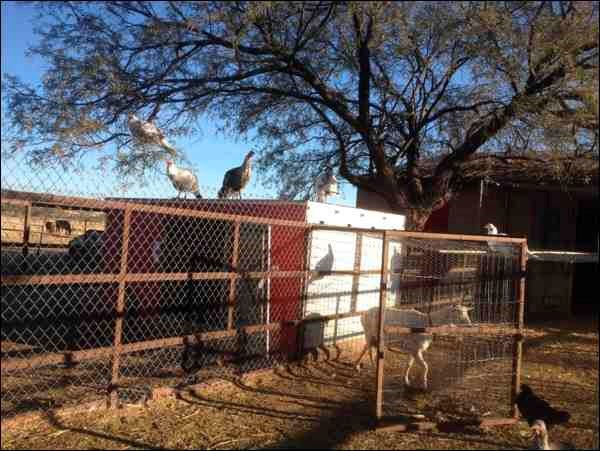Returning to Canada, my life is far from being near enough to imagine the strife one encounters when living near escapees across the Mexican border. It was an eye opening experience to have lived where walkers, illegal immigrants, came across the barren desert. It's a trek that claims many lives annually and the farm is often visited by these weary travellers.
I was informed by Tina, if I happened to encounter a walker, I was allowed to give them food and water but nothing else. A border patrol checkpoint was no more than seven miles from the farm, right outside of Amado, and there is strict enforcement against illegal immigration movements, especially within 30 miles of the border. That was where border patrol officers have more power than anywhere else in the country and often send walkers back by the busload.
I met a walker named Fernando who had been walking for three days. When he arrived at the farm, I offered him some Cliff peanut butter bars and a couple of large grapefruits. Fernando was very interested in finding a map towards Tucson, another hour and a half drive north -I can't imagine how long the walk would be - and was also very interested in avoiding border patrol.
Eventually, after he was fed a sandwich and some milk, took some time to rest and replenished his water supplies, he wandered back south into the wash that led east towards Amado before, I imagine, turning north all the way up to Tucson.
When we think we have it bad, I can't imagine what it would be like to have been Fernando, what had led to that huge walk and whether or not he had made it through to a better life. He literally risked everything to walk for, first, three days through a U.S. desert swarming with armed and aggressive border patrol officers, then perhaps hitching a ride along the highway.
It was not uncommon for army helicopters and jet fighters to fly over the farm and even buzz the house, to Jim's dismay. There was an air force base very close to the farm and it wasn't an oddity to see A-10 bombers every week in groups of two or more, arcing sideways a mere eye distance from where I would stand in the garden with my hands like a visor to block the sun.
Security for us was tight as well. Every time I left the farm, I would have to show my Canadian passport when passing through a checkpoint. Border security is a must, but there has always been contention surrounding the issue.
While I was on the farm, a Quebec television crew showed up to film an episode based around the concept of having people in conflict sit down for a meal together, cooked by professional chefs. The guests were a retired border patrol officer, a woman who had escaped Mexico when she was younger and, at the last second, Jim. One of the chefs told me the French program would be aired in Quebec and was roughly translated from French to mean "Dining With ..."
Steaks were cooked on an outdoor brick barbecue, fed with mesquite trees Gabriel and I gathered from the desert. I was in charge of sanding plates. We had cut large logs into slices that were sanded smooth to the touch and were used for an authentic "roughing it" feel, as Jim would say. I was told the show will air sometime in the next year.
Being so close to California, my only other run-in with an entertainment industry type was when the new farm manager from Los Angeles replaced Mark. The replacement's name was Al and, before he arrived, I had been told a bit about him. He would ride his skateboard into work in Hollywood every day, but was seeking a major life change. He was moving onto the farm with his wife and two young boys.
On one of his trips to see the farm, before the big move, Jim and I picked him up from the airport in Tucson and, on the long ride back, I listened to them talk and asked a few questions of my own. Al played rugby, actually used to be on the U.S. rugby team, and was formerly post-production editor for the ABC prime-time show Scandal, with Kerry Washington. I mentioned I never watched the show but had heard of it and saw Washington host Saturday Night Live. He mentioned it was a funny episode, as if proud of his work.
Being an editor, Al was in charge of all the final cuts, the soundtrack and deciding what camera angle shot was to be kept and what would be cut.
His reason for leaving the rat race of Hollywood was to get away from it all and spend more quality time with his family. "So many of my coworkers say they wish they could do the same, give it all up, leave it all behind and just move out to a farm and do something away from the city," he said. "I told them they can, I'm doing it....and a lot of them showed a lot of interest in coming to visit."
On my visit, my best joke of why working on the farm was premium is you can't beat the commute, just a five-minute walk from work to your door. It sure beats city traffic and that's a given. There's also no rule of bathing and clothes often smell of manure. And nothing beats unpasteurized milk. Delicious.
Also, if you choose to, you can get into chewing tobacco, just to keep it real country, because spitting is a necessity when rounding up cows. It goes well with the "Haw!Haw!" you have to yell; something acoustic about that protruding lower lip gives you a good drawl.
Haw! It's probably the last thing I'll forget when I think about organic farming.


.png;w=120;h=80;mode=crop)

